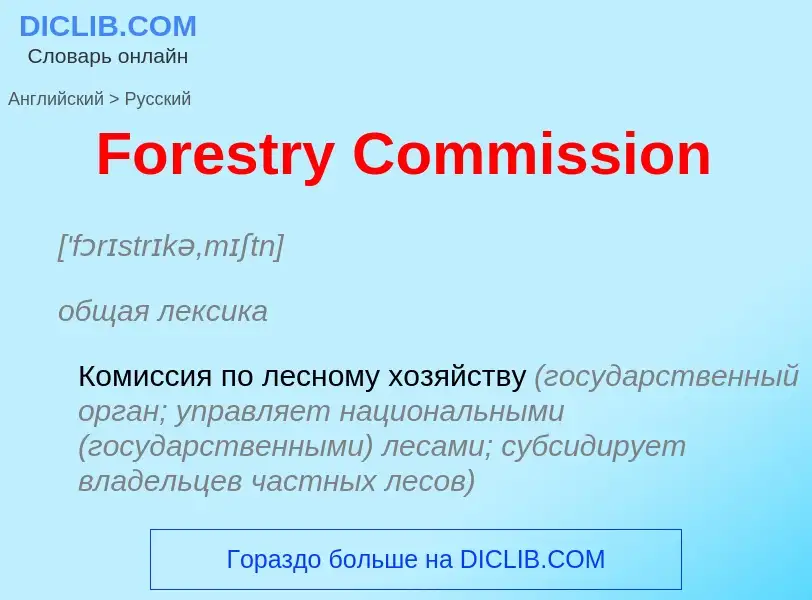Перевод и анализ слов искусственным интеллектом ChatGPT
На этой странице Вы можете получить подробный анализ слова или словосочетания, произведенный с помощью лучшей на сегодняшний день технологии искусственного интеллекта:
- как употребляется слово
- частота употребления
- используется оно чаще в устной или письменной речи
- варианты перевода слова
- примеры употребления (несколько фраз с переводом)
- этимология
Forestry Commission - перевод на русский
['fɔrɪstrɪkə,mɪʃtn]
общая лексика
Комиссия по лесному хозяйству (государственный орган; управляет национальными (государственными) лесами; субсидирует владельцев частных лесов)
[,rɔɪtlkə'mɪʃtn]
общая лексика
королевская комиссия (назначается монархом по рекомендации правительства из числа наиболее авторитетных лиц для изучения какого-либо вопроса и представления рекомендаций правительству)
[,tʃærɪtɪkə'mɪʃən]
общая лексика
Комиссия по делам благотворительных организаций (государственный орган; регистрирует благотворительные организации Великобритании)
Определение
Википедия
The Forestry Commission is a non-ministerial government department responsible for the management of publicly owned forests and the regulation of both public and private forestry in England.
The Forestry Commission was previously also responsible for Forestry in Wales and Scotland. However, on 1 April 2013, Forestry Commission Wales merged with other agencies to become Natural Resources Wales, whilst two new bodies (Forestry and Land Scotland and Scottish Forestry) were established in Scotland on 1 April 2019.
The Forestry Commission was established in 1919 to expand Britain's forests and woodland, which had been severely depleted during the First World War. The Commission bought large amounts of agricultural land on behalf of the state, eventually becoming the largest manager of land in Britain. Today, the Forestry Commission is divided into three divisions: Forestry England, Forestry Commission and Forest Research. Over time the purpose of the Commission broadened to include many other activities beyond timber production. One major activity is scientific research, some of which is carried out in research forests across Britain. Recreation is also important, with several outdoor activities being actively promoted. Protecting and improving biodiversity across England's forests are also part of the Forestry Commission's remit.
The Commission received criticism for its reliance on conifers, particularly the uniform appearance of conifer forests and concerns over a lack of biodiversity. Furious protests from the general public and conservation groups accompanied attempts to privatise the organisation in 1993 and 2010.



